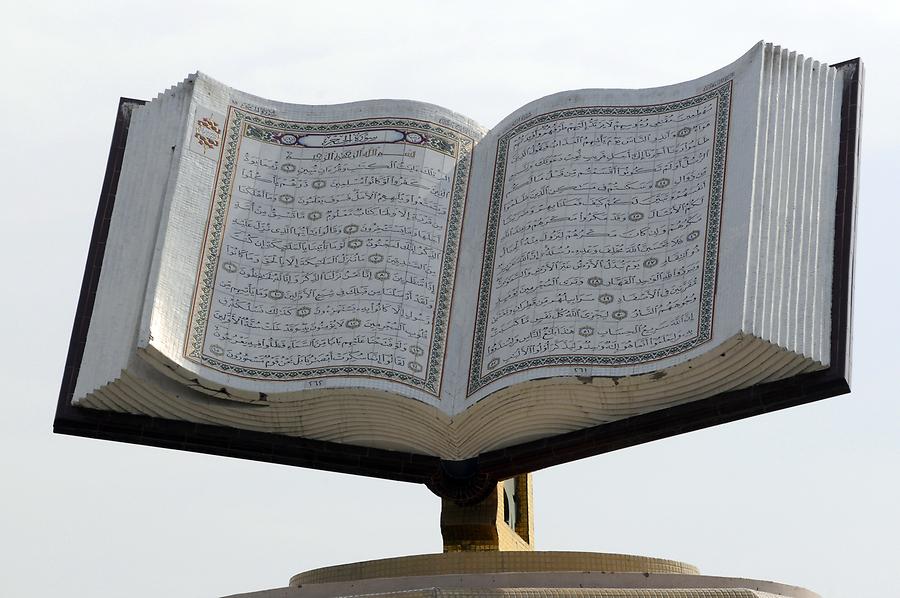Koran#

Koran, January 2011, © Gerhard Huber, under CC BY-NC 4.0 +Edu
The Islam is the profession of faith for almost all Moroccans, founded at the beginning of the 7th century by the shepherd and merchant Mohammed. However, he did not create a completely new religion, but originally developed a reform concept for Judaism that had long since arrived on the Arabian Peninsula. In his teachings, he also mixed Bedouin tribal traditions with Persian and Christian traditions. Jews and Christians are therefore recognized as predecessors of Islam, as are Moses, John and Jesus as prophets. Muhammad is only considered the last but most perfect prophet, who is worshipped as a person and not as a son of God. The doctrine is based on 5 pillars. Above all stands the declared belief in a single god, in Arabic: Allah. He determines the destiny of each person. Whether he is rewarded at the Last Judgement with paradise or punished with the torments of hell, depends on the observance of numerous commandments and prohibitions including the prayer announced by the muezzin, which the faithful has to say towards Mecca five times a day. However, to visit a mosque is only compulsory for the Friday prayer, which is directed by an imam. Imams are, however, only the leaders of the litany, respected members of the religious community without any power. Islam has no hierarchy and no institutionalized priesthood, a consequence of the non-hierarchical Bedouin ideal to which Mohammed felt obliged. Only the Muslim scholars who are entrusted with the interpretation of the sacred Scriptures and often serve as judges and advisers to the rulers wield a special authority.
The Koran is the statement of faith of Islam. His 114 suras are considered the revelation of Allah. Therefore, they should t be taken literally and not be questioned. The sacred book is supplemented by the Sunna, a comprehensive collection of Muhammad's sayings and reports of his life. Since these were erroneously handed down and sometimes even contradict the Koran, their interpretation by Islamic scholars is of great importance. This often causes heated debates, for example regarding the veiling, which the Koran does not explicitly dictate. The sacred Scriptures and the example of the Prophet serve as a sufficient basis to teach and spread Islam -that will do. This is one of the reasons why its influence was spread so quickly by missionizing traders.
Shortly after Mohammed's death, the constant schism of Islam took place, caused by the power struggle concerning the position of the caliph, the prophet's successor. One group believed that only physical offspring of Muhammad were allowed to execute this office. They formed the group of the more conservative Shiites, who now represent 15% of all Muslims and are mainly resident in Iran and Iraq. On the other hand, the Sunnites as the vast majority chose a caliph from Muhammad's tribe as his legitimate successor, who was not characterized by kinship but by political talent alone. Unlike to the Shiites, the sunna as the accompanying text of the Koran forms a central part of their belief - hence their name: Sunnites. Almost all Moroccans profess this mostly more moderate religious orientation.
Fast alle Marokkaner bekennen sich zum Islam, der Anfang des 7. Jahrhunderts vom Schafhirten und Händler Mohammed begründet wurde. Er schuf jedoch keine völlig neue Religion, sondern entwickelte ursprünglich ein Reformkonzept für das Judentum, dass auf der arabischen Halbinsel längst Einzug gehalten hatte. In seinen Lehren vermischte er zudem beduinische Stammestraditionen mit persischen und christlichen Überlieferungen. Juden und Christen werden daher als Vorläufer des Islam anerkannt, ebenso Moses, Johannes und Jesus als Propheten. Mohammed gilt nur als letzter aber vollkommenster Prophet, der als Mensch und nicht als Sohn Gottes verehrt wird. Die Glaubenslehre fußt auf 5 Pfeilern. Allen voran steht das Bekenntnis zu einem einzigen Gott, arabisch Allah. Er bestimmt das Schicksal jedes Menschen. Ob dieser beim jüngsten Gericht mit dem Paradies belohnt oder mit Höllenqualen bestraft wird, hängt von der Befolgung zahlreicher Ge- und Verbote ab. Dazu gehört das vom Muezzin angekündigte Gebet, das der Gläubige fünfmal täglich in Richtung Mekka spricht. Der Besuch einer Moschee ist allerdings nur für das Freitagsgebet vorgeschrieben, das von Imamen geleitet wird. Imame sind jedoch nur Vorbeter, angesehene Gemeindemitglieder ohne Machtstellung. Der Islam kennt keine kirchliche Organisation und keinen institutionalisierten Priesterstand, eine Folge des hierarchielosen Beduinen-Ideals, dem sich Mohammed verpflichtet fühlte. Eine besondere Machtstellung genießen nur muslimische Gelehrte, die mit der Auslegung der heiligen Schriften betraut sind und oft als Richter und Berater der Herrschenden fungieren.
Der Koran bildet die Glaubensgrundlage des Islam. Seine 114 Suren gelten als Offenbarung Allahs. Sie sind daher wörtlich zu nehmen und nicht zu hinterfragen. Ergänzt wird das heilige Buch durch die Sunna, eine umfangreiche Sammlung von Aussprüchen Mohammeds und Berichten aus seinem Leben. Da diese fehlerhaft überliefert sind und manchmal sogar im Widerspruch zum Koran stehen, kommt ihrer Auslegung durch islamische Gelehrte große Bedeutung zu. Daran entzünden sich oftmals hitzige Debatten, beispielsweise betreffend der Verschleierung, die der Koran nicht ausdrücklich vorschreibt. Die heiligen Schriften und das Vorbild des Propheten dienen als ausreichende Basis, den Islam zu lehren und zu verbreiten – mehr braucht es dazu nicht. Dies ist einer der Gründe, warum sich sein Einfluss einst durch missionierende Händler so schnell verbreitete.
Schon kurz nach Mohammeds Tod kam es zu einer dauerhaften Spaltung des Islam, ausgelöst durch den Machtkampf um die Position des Kalifen, des Propheten-Nachfolgers. Die eine Gruppe vertrat die Meinung, das nur leibliche Nachkommen Mohammeds das Amt ausüben dürften. Sie formierten sich zur Gruppe der eher konservativeren Schiiten, die heute 15 % aller Muslime ausmachen und vor allem im Iran und Irak beheimatet sind. Die überwiegende Mehrzahl, die Sunniten, wählten dagegen einen Kalifen aus dem Stamm Mohammeds zum rechtmäßigen Nachfolger, der sich nicht durch ein verwandtschaftliches Verhältnis, sondern allein durch politisches Talent auszeichnete. Im Gegensatz zu den Schiiten bildet die Sunna, der Begleittext des Koran, einen zentralen Glaubensinhalt – daher auch ihr Name: Sunniten. Fast alle Marokkaner bekennen sich zu dieser meist etwas gemäßigteren Richtung.